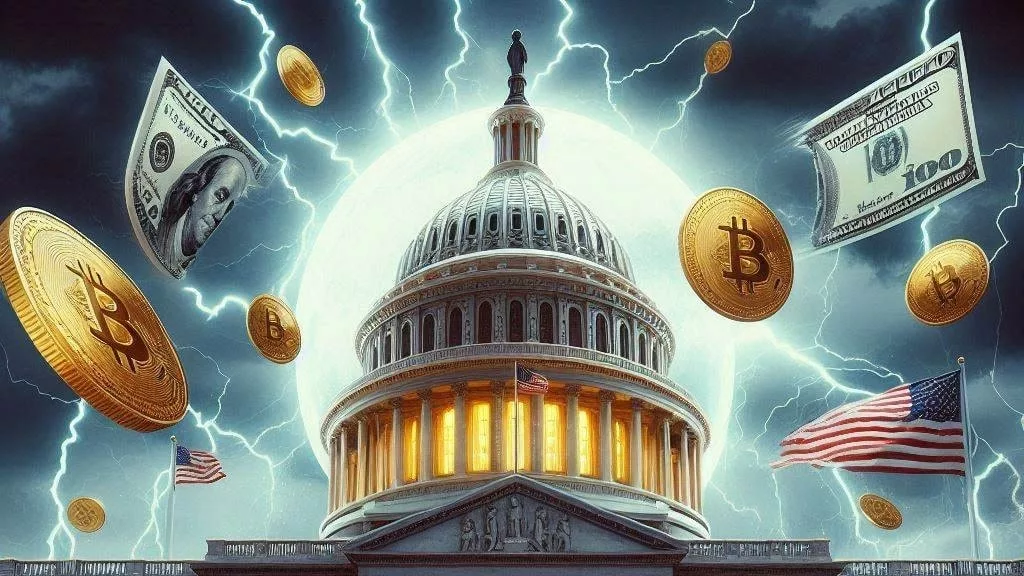
Senator Cynthia Lummis has reintroduced the BITCOIN Act of 2025, a bold legislative proposal that aims to establish a U.S. Strategic Bitcoin Reserve. The bill, which is now moving through the Senate for further debate, seeks to integrate Bitcoin (BTC) into the U.S. financial framework, positioning the digital asset as a potential solution to the nation’s growing debt crisis.
The bill has gained traction following the introduction of a similar measure last year, which ultimately failed to pass. With stronger backing this time, including support from notable Republican senators, the Bitcoin Act is making another attempt to gain approval. This legislative push follows an executive order from former President Donald Trump, which set up a Bitcoin reserve based on confiscated assets from federal seizures.
Senator Lummis, a long-time advocate for Bitcoin, emphasized the importance of this legislation, stating, “Bitcoin is not simply a technological opportunity, but a national imperative for America’s continued financial leadership in the 21st century.” The bill is supported by a growing coalition of senators and representatives, including Senators Jim Justice, Tommy Tuberville, and Roger Marshall, who argue that Bitcoin is essential for the U.S. to maintain its economic dominance in the digital age.
The proposed legislation seeks to institutionalize Bitcoin holdings within the U.S. Treasury, establishing a reserve that would continuously accumulate BTC over the coming years. If passed, the BITCOIN Act would mandate the government to purchase 200,000 BTC annually for five years, ultimately allowing the U.S. to amass 1 million BTC by 2029. These holdings would be maintained for at least 20 years and managed exclusively by the U.S. Treasury, with no taxpayer funds required.
The primary aim of the Bitcoin Reserve is to help address the U.S. national debt, which has soared to over $31 trillion. Financial analysts have raised the possibility that Bitcoin could play a significant role in reducing this debt, particularly if its price appreciates over the long term.
A recent report from asset manager VanEck, which manages $115 billion, estimates that if the U.S. accumulates 1 million BTC and holds them until 2049, the reserve could be worth $42.4 trillion. This increase in value could help offset a significant portion of the national debt, potentially covering up to 35% of it. Even under more conservative growth scenarios, Bitcoin’s reserves could still reduce the debt by at least 18%.
However, critics have pointed to Bitcoin’s inherent volatility as a significant risk. A downturn in the cryptocurrency’s price could undermine the reserve’s effectiveness, potentially exposing the U.S. to additional fiscal challenges. Despite these concerns, supporters argue that Bitcoin’s long-term growth potential makes it a promising asset for the country’s future.
While Bitcoin’s price is currently hovering around $81,000, market sentiment has taken a hit in recent weeks. The Crypto Fear and Greed Index has entered the “Extreme Fear” zone, reflecting investor unease and uncertainty about the market’s direction. This heightened fear could influence the success of the Bitcoin Act, as some lawmakers are concerned about the risks associated with Bitcoin’s volatility.
Despite these fears, the backing of high-profile figures like Trump’s former crypto policy advisor David Sacks and Bitcoin advocate Michael Saylor has bolstered the bill’s chances of success. Saylor, in particular, has underscored the importance of the Bitcoin Reserve in ensuring U.S. digital supremacy.
The BITCOIN Act is currently under review by the Senate Committee on Banking, Housing, and Urban Affairs, where its economic and security implications will be debated. A similar version of the bill is also being reviewed in the House of Representatives, with Congressman Nick Begich championing the cause.
If both bills pass their respective chambers, they will be consolidated for a joint vote before being sent to President Trump for final approval. While the bill faces opposition, particularly from lawmakers concerned about Bitcoin’s volatility, the growing Republican support and Trump’s endorsement suggest that the proposal could gain the traction needed to become law.
Senator Lummis’ reintroduction of the BITCOIN Act represents a significant step toward integrating Bitcoin into the U.S. financial reserves. The proposed U.S. Bitcoin Reserve could potentially help mitigate the national debt, but its success will depend on the volatile nature of the cryptocurrency market and the willingness of lawmakers to embrace this bold financial strategy. As the bill moves through Congress, its implications for both the U.S. economy and the global digital currency landscape will become clearer.



Get the latest Crypto & Blockchain News in your inbox.